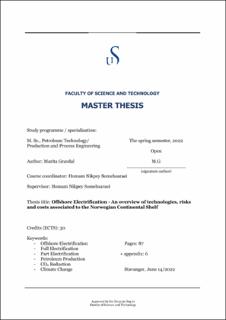| dc.description.abstract | The concentration of greenhouse gases in the atmosphere is increasing rapidly because of burning fossil fuels. To reduce future emissions, the electrification of offshore oil and gas installations is discussed. The electrification of offshore oil and gas platforms is a method that has the possibility to safely reduce CO2 emissions, that would have been emitted into the atmosphere if the traditional gas turbines are used to power the platforms. Different methods used to reduce CO2 emissions have been a topic of discussion for many years. Leading the way for offshore electrification is the growing interest in green energy and the environment, along with the goal to reach net-zero by 2050.
Through the case study, it is shown that offshore electrification with power from shore of the Norwegian Continental Shelf is highly possible and necessary for Norway as a country, with respect to reducing CO2 emissions and extending the lifetime of the petroleum industry, and strengthening Norwegian economy.
When replacing gas turbines and generators with power from shore to power offshore platforms, it is shown that full electrification has the potential to reduce 100% of the annual CO2 emissions. Part electrification has the potential to reduce 51% of the emissions. Electrification of offshore platforms will contribute to a greener petroleum production compared to today’s production. As only 50% of the available petroleum resources on the Norwegian Continental Shelf remain, it is estimated that petroleum production can continue for many years. The decrease in future CO2 emissions as a result of offshore electrification will secure Norwegian finance, but not yet alone it will secure many workers.
However, it needs to be mentioned that the offshore electrification aspect of the petroleum industry is promising when looking at both reducing climate change and the Norwegian economy. Without a doubt, more research is needed on the topic to be able to get a clear picture of the risks and costs compared with the positive aspect of reducing future CO2 emissions by electrification of offshore platforms. | |
